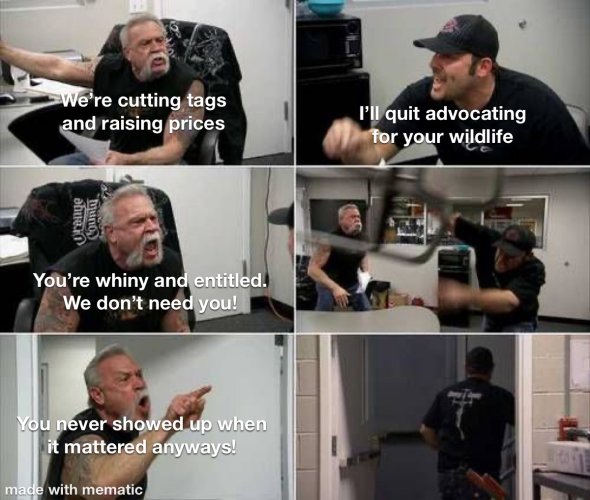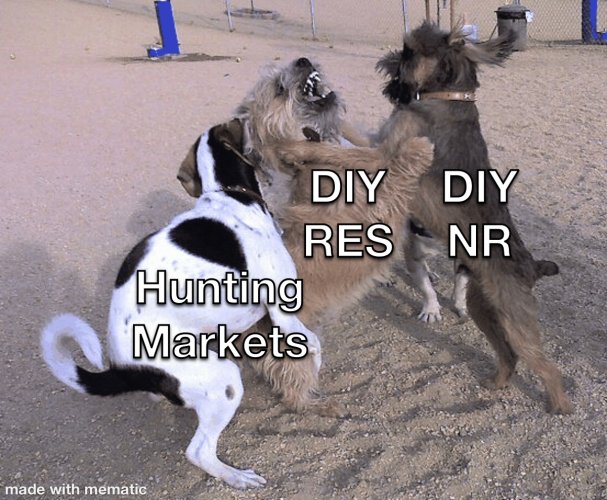That might be. Share the evidence that demonstrates those items are impacting the tag allocation, and resulting tension between, resident/non-resident opportunity, the topic of this video.What about 3) Increased hunter recruitment and popularity from social media?
Navigation
Install the app
How to install the app on iOS
Follow along with the video below to see how to install our site as a web app on your home screen.
Note: This feature may not be available in some browsers.
More options
You are using an out of date browser. It may not display this or other websites correctly.
You should upgrade or use an alternative browser.
You should upgrade or use an alternative browser.
Screwing over the Non-resident (or not)?
- Thread starter Big Fin
- Start date
- Status
- Not open for further replies.
cgasner1
Well-known member
- Joined
- Apr 24, 2016
- Messages
- 4,285
I’d say just the internet in general has changed things I’ve been hunting as a non resident in states for over 15 years. I feel like it use to be a lot of people once in a lifetime trip out west to hunt elk. Then people started realizing it didn’t need to be. When you already live in a state that allows the amount of hunting mine does and see what nr pressure does to things it really doesn’t bother you that the other states are trying to control it for their residents
Completely agree I’ve only elk hunted in Wyoming 1 time I hope to do it at least 1 more time. The more and more complaints I see about Wyoming the more I think residents should limit it more. I would love to see nonresident regional caps in Montana. The deer could sure use it.I’d say just the internet in general has changed things I’ve been hunting as a non resident in states for over 15 years. I feel like it use to be a lot of people once in a lifetime trip out west to hunt elk. Then people started realizing it didn’t need to be. When you already live in a state that allows the amount of hunting mine does and see what nr pressure does to things it really doesn’t bother you that the other states are trying to control it for their residents
cgasner1
Well-known member
- Joined
- Apr 24, 2016
- Messages
- 4,285
I also fell into the category of loaded my stuff in my truck and took off like back to the future. The state I grew up in has a 90/10 split and half of the 10 goes to outfitters. They also run a true preference so the unit my best friend from childhood hunts every other year I’ll probably never step foot in again with a tag in my pocket. I actually have better odds at a super tag than actually drawing my tag.Completely agree I’ve only elk hunted in Wyoming 1 time I hope to do it at least 1 more time. The more and more complaints I see about Wyoming the more I think residents should limit it more. I would love to see nonresident regional caps in Montana. The deer could sure use it.
rmyoung1
Well-known member
- Joined
- Jul 12, 2010
- Messages
- 2,481
This conversation has me wondering about the future unintended consequences. Let's face it... the American worker/retiree is more mobile now than ever. If states continue to trim nonresident hunting opportunities, how many of those nonresidents simply choose to become residents? I think 25 years ago, this idea would seem far-fetched. Not so now. If Colorado, for example, goes to 90/10, how many Texans simply become Coloradoans? That might be even worse for the Colorado resident than 65/35 or 75/25 or whatever. I don't know the answer. But in this day and age, some amount of hunter migration will certainly happen.
Pucky Freak
Well-known member
Pucky Freak
Well-known member
406dn
Well-known member
- Joined
- Dec 12, 2019
- Messages
- 2,484
I just got in from picking up after the dogs, and attending to some horse chores. That gives a guy a chance to think.
Thinking about Trial123's desire to have tags reflect the market value, I came up with an idea for trying it out in Montana. We actually had a first cousin of this some years ago, with licenses set aside for outfitters. They were priced to make likely the total elk tags sold did not exceed the mandated 17,000. If too many licenses were sold the price was raised. If the total sold fell under the cap, the price would be reduced.
An initiative actively opposed by the outfitting lobby, ended that program.
So, here the idea... beginning with maybe 500 elk tags from the 170000, put them up for auction. Maybe hold back the last 50 of those, to be sold individually, by auction of course.
If that proves successful, hold back additional tags to be sold at auction, until you find what the market will bear.
Actually, I would not want that.
No one puts forward a proposal that they do not individually think, would harm their interests. So, when some one proposes that tags should fetch the market price, you can be certain, they see themselves advantaged by that.
It would only serve a very small slice of non resident hunters to get the market price for each and every license. Instead of being unable to draw a tag, they just could not afford the price of a big game tag.
We have a supply and demand problem with no clean solution. We can't open up another factory to crank out more elk.
Thinking about Trial123's desire to have tags reflect the market value, I came up with an idea for trying it out in Montana. We actually had a first cousin of this some years ago, with licenses set aside for outfitters. They were priced to make likely the total elk tags sold did not exceed the mandated 17,000. If too many licenses were sold the price was raised. If the total sold fell under the cap, the price would be reduced.
An initiative actively opposed by the outfitting lobby, ended that program.
So, here the idea... beginning with maybe 500 elk tags from the 170000, put them up for auction. Maybe hold back the last 50 of those, to be sold individually, by auction of course.
If that proves successful, hold back additional tags to be sold at auction, until you find what the market will bear.
Actually, I would not want that.
No one puts forward a proposal that they do not individually think, would harm their interests. So, when some one proposes that tags should fetch the market price, you can be certain, they see themselves advantaged by that.
It would only serve a very small slice of non resident hunters to get the market price for each and every license. Instead of being unable to draw a tag, they just could not afford the price of a big game tag.
We have a supply and demand problem with no clean solution. We can't open up another factory to crank out more elk.
NR should take note of that trend and support every single initiative that allocates tags that can be put onto the free market.
100% correct. I have been saying the same on thing on here for a few years now, much to the chagrin of most of HT.
Transferable landowner tags are the way of the future for NR DIY hunters, I can’t see a way around that at this point.
Last edited:
SAJ-99
Well-known member
This conversation has me wondering about the future unintended consequences. Let's face it... the American worker/retiree is more mobile now than ever. If states continue to trim nonresident hunting opportunities, how many of those nonresidents simply choose to become residents? I think 25 years ago, this idea would seem far-fetched. Not so now. If Colorado, for example, goes to 90/10, how many Texans simply become Coloradoans? That might be even worse for the Colorado resident than 65/35 or 75/25 or whatever. I don't know the answer. But in this day and age, some amount of hunter migration will certainly happen.
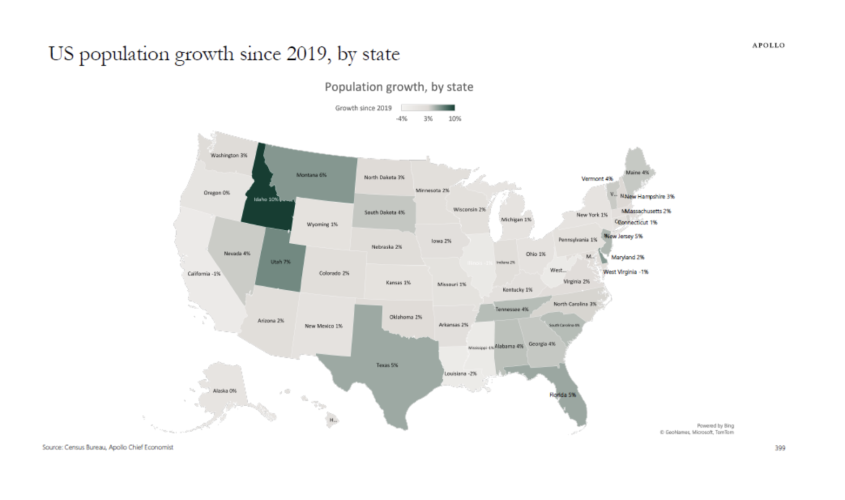
I wonder what the ratio on HT is if the following type of post:
1. NR’s being told to move to western states if they want to hunt there.
2. R’s of western states complaining how expensive it has become to move/live where they live.
It has to be very close to 50/50. Silly.
1. NR’s being told to move to western states if they want to hunt there.
2. R’s of western states complaining how expensive it has become to move/live where they live.
It has to be very close to 50/50. Silly.
cgasner1
Well-known member
- Joined
- Apr 24, 2016
- Messages
- 4,285
Think that has anything to do with about 4000 people a day being added to the country?
Nicoli7153
Well-known member
- Joined
- Sep 9, 2021
- Messages
- 536
Don't mind paying more if it wasn't so dang crowded!!!!! Really detracts (at least for me) the purpose of being outdoors and hunting.
Precisely why I would pay more. That scenario will be a tough battle here in Montana. mtmuley100% correct. I have been saying the same on thing on here for a few years now, much to the chagrin of most of HT.
Transferable landowner tags are the way of the future for NR DIY hunters, I can’t see a way around that at this point.
Caseknife
Well-known member
Excellent video, Randy and Marcus. It is easier for States to raise NR tag prices because NR have no say in the matter. Have to be a lot more careful in raising resident prices, may cause a huge uproar that they will have to listen too.
It is very disturbing to me that other State game commissions are looking at Washington as an example how to operate in the future. Having a pro-predator commission that is tossing around the idea that with enough predators to control the game population, may not need hunters in the future. That in itself is way more concerning to me than having to pay more for NR tags.
It is very disturbing to me that other State game commissions are looking at Washington as an example how to operate in the future. Having a pro-predator commission that is tossing around the idea that with enough predators to control the game population, may not need hunters in the future. That in itself is way more concerning to me than having to pay more for NR tags.
Last edited:
406dn
Well-known member
- Joined
- Dec 12, 2019
- Messages
- 2,484
I wonder what the ratio on HT is if the following type of post:
1. NR’s being told to move to western states if they want to hunt there.
2. R’s of western states complaining how expensive it has become to move/live where they live.
It has to be very close to 50/50. Silly.
There is a difference, the residents of any state can't stop you from moving there. They can limit you hunting there as a non resident.
What's silly is non residents asking residents to move off the feed dish, so that the non resident can eat their fill.
I wonder the same thing. In Montana, we have not seen a huge increase in resident hunting license sales, even though we have a large increase in resident population growth. That is probably an overly simplistic way of correlating the two as it relates to resident demand for status quo in opportunity.This conversation has me wondering about the future unintended consequences. Let's face it... the American worker/retiree is more mobile now than ever. If states continue to trim nonresident hunting opportunities, how many of those nonresidents simply choose to become residents? I think 25 years ago, this idea would seem far-fetched. Not so now. If Colorado, for example, goes to 90/10, how many Texans simply become Coloradoans? That might be even worse for the Colorado resident than 65/35 or 75/25 or whatever. I don't know the answer. But in this day and age, some amount of hunter migration will certainly happen.
I can say we moved here in 1991 for that exact reason. I had went to college in Arizona. I saw how hard it was for residents to hunt a lot there. I finished college in Nevada and lived there for three years after. Hunting every year was hard, due to tags all being on a draw. When offered jobs in Montana, we did it, knowing the pay cuts would suck. But, we understood how much easier it is to take a pay cut at 25, than at 35/45/55, or when the kids are in school and have their circle of friends. We did it and given it was our priority in life, we've never regretted it. We accepted the low pay/high cost as part of the decision and dealt with it.
I don't say that in disrespect for others who choose to do differently, but a move like that carries a huge financial cost and surely vests you in the work of access, conservation, and sustaining the things for which you made that decision. I'm not sure how many other people are foolish enough to do it just for the hunting.
Here is what FWP shows as the change (-7.2%) in hunter license sales in Montana from 2012-2022.
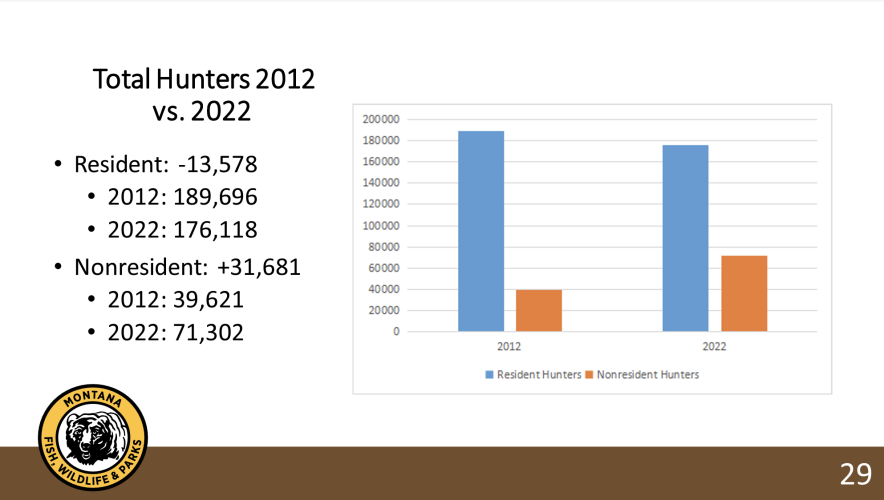
Here is the Montana population change (+11.8%) over that same period. Interesting how the population has grown so much and resident hunter license sales have actually decreased.
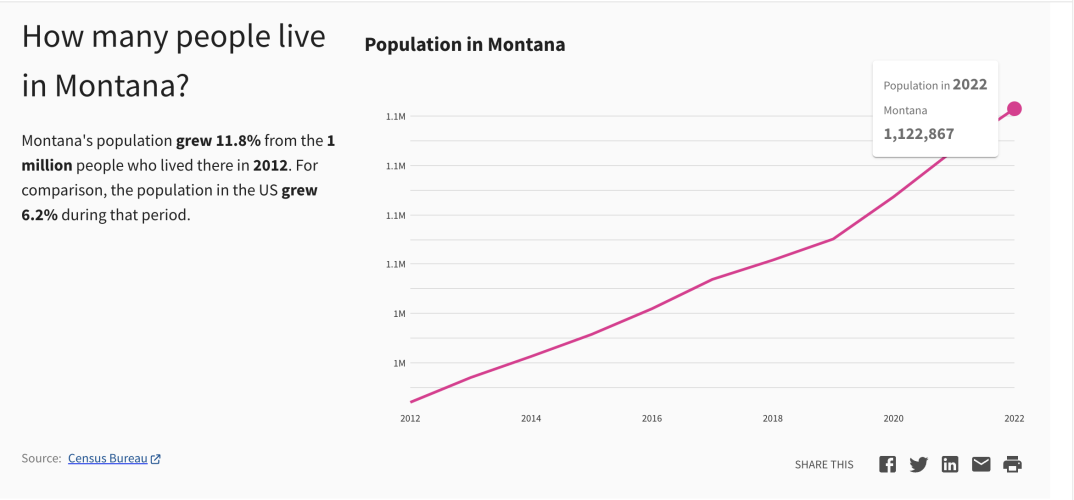
SAJ-99
Well-known member
Might have to get rid of point systems. Maybe combine the two and have the bidding be in points, particularly in high-demand tags. If a guy with 15 points that has always been 3 points behind "the number", that guy could bid 19 and buy 4 more points ($100/pt or something). A guy at zero points could bid 18 and buy them all. Eventually you get rid of all the point buying each year. State F&G might go broke though. LOL. Just thinking of crazy ideas.So, here the idea... beginning with maybe 500 elk tags from the 170000, put them up for auction. Maybe hold back the last 50 of those, to be sold individually, by auction of course.
If that proves successful, hold back additional tags to be sold at auction, until you find what the market will bear.
Not really.Think that has anything to do with about 4000 people a day being added to the country?
- Status
- Not open for further replies.
Similar threads
- Replies
- 0
- Views
- 198
- Replies
- 67
- Views
- 4K




